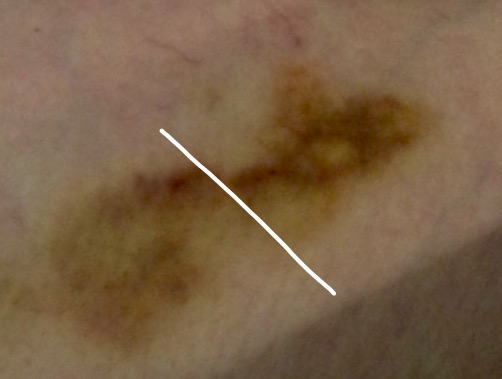I would like to share this post by Dr. Mercola about why we might bruise easily, and what to do to prevent it and to treat it when it happens. Just a couple of tips: Vitamin K cream is helpful both in preventing and treating bruises. Also, the most common causes of bruising in my practice are aging, thinning of the skin from chronic sun exposure, and taking medications such as aspirin, Plavix, Coumadin, Naprosyn, and Aleve, or supplements such as vitamin E, fish oil, garlic, gingko biloba, and St. John’s wort. Alcohol also inhibits platelet aggregation and can make you more prone to bruising.
When patients in my practice are undergoing procedures, we review all of this information with them, and typically recommend arnica gel and tablets both before and during or immediately after a procedure, cold compresses, vitamin K, and sometimes a medication called Biafine. Laser of bruises makes them go away in days rather than a week or two, and my patients receive complementary laser for an bruises that might occur despite all of our precautions. I will employ a blunt-tipped cannula rather than a sharp needle in those who are prone to bruising as well. As a result, bruising is no longer a major problem when procedures are performed.See Less Bruising and Discomfort with Filler Injections for more information about cannulas.
Here is an image of a bruise. the left half was treated with laser:

This is how it looked approximately 28 hours later:

By Dr. Mercola
Any type of traumatic injury, such as a fall, can cause capillaries (small blood vessels) near your skin’s surface to break and leak red blood cells. This causes the reddish-purple or “black and blue” appearance of bruises on your skin.
Technically known as contusions, bruises may result from virtually any injury to blood vessels in your skin. As your body begins to heal, and metabolizes the blood cells, the bruise will typically fade to a green, yellow, or brown color before disappearing entirely.
It’s virtually inevitable that you’ll get a bruise once in awhile, but if you have bruises appearing often and can’t figure out why, there could be an underlying reason. You may have simply bumped your arm or leg and forgotten, or it could be something else entirely.
9 Reasons You May Bruise Easily
1. Your Age
As you get older, your skin loses some of the protective fatty layer that provides cushioning against bumps and falls. Your skin also becomes thinner while the production of collagen slows. This means that it generally takes much less force to cause a bruise than it did when you were younger.
2. Purpuric Dermatosis
This vascular condition, which is more common in the elderly, causes thousands of tiny bruises, often on your shins, which may have the appearance of cayenne pepper from afar.1 The bruises are the result of blood leaking out of small capillaries.
3. Blood Disorders
Blood disorders such as hemophilia and leukemia can cause unexplained bruising, often because your blood fails to clot properly. If you have severe and frequent unexplained bruising, it’s a good idea to see a physician to rule out such disorders, especially if it seemed to come on suddenly.
4. Diabetes
People with diabetes may develop dark skin discolorations, often in areas where skin touches other skin frequently. These discolorations may be mistaken for bruises, but they are actually due to underlying insulin resistance.
5. Excessive Straining During Exercise
Putting your muscles under excessive strain, such as may occur during heavy weight lifting, can cause blood vessels to burst and lead to bruising. Microscopic tears in your muscle fiber caused by exercise can also cause bruises. In addition, if you engage in sports or vigorous exercise, you may be exposed to bumps and small traumas that cause bruises but not remember the actual impacts.
6. Certain Medications
Medications such as aspirin, anticoagulant medications, and anti-platelet agents reduce your blood’s clotting ability and make bruising more likely. Medications including aspirin, prednisone, prednisolone, oral contraceptives, and others may also weaken your blood vessels, which increases the likelihood of bruises.2
7. Family History
If you have close family members that tend to bruise easily, there’s a chance you will too (although there are usually steps you can take to overcome this potential genetic tendency).
8. Pale Skin
Pale skin doesn’t make you more prone to bruising, but it does make any bruises you do get more visible than they would be on someone with darker skin.
9. Sun Damage
While your body needs regular sun exposure to produce vitamin D (and get a host of additional benefits), excessive sun exposure – especially the type that leads to burning – can cause your skin to lose its pliability and resilience. This, in turn, makes bruising easier and more noticeable.
Your Diet May Be the Most Important Factor in How Easily You Bruise
The reason why most people bruise is that their capillaries are too fragile and essentially are easily torn. One of the best ways to ensure that your capillaries remain strong and flexible is to make sure you have an excellent source of bioflavonoids in your diet. Excellent dietary sources of bioflavonoids include dark-colored berries, dark leafy greens, garlic, and onions.
Typically, a well-rounded diet with plenty of organic vegetables and some fruits will be more than sufficient to provide all the micronutrients you will need to prevent bruising from all but the most severe traumas. However, if you bruise easily, the following nutrients will be especially important and if you’re not getting enough of them via your diet a supplement may be useful:
Rutin
Rutin is a bioflavonoid known to strengthen blood vessels. For this reason, it’s often used for varicose veins and hemorrhoids, as well as bruising. In fact, a deficiency of bioflavonoids may allow blood vessels to break easier, which is why, if you bruise easily, you would likely benefit from taking rutin.
In one study of people with progressive pigmented purpura, the skin lesions were completely cleared after four weeks of treatment with a rutin (50 mg twice a day) and vitamin C supplement.3
Hesperidin
This bioflavonoid, found in citrus peels, is also known for strengthening capillaries. In a study of menopausal women, those who took a daily supplement of hesperidin and vitamin C had reduced bruising.4
Vitamin C
In people with low vitamin C intake, increasing vitamin C has been found to reduce bruising.5 Taking vitamin C along with bioflavonoids like rutin or hesperidin is recommended, as they may improve vitamin C’s effectiveness and absorption.6 As reported by the University of Michigan Health System:7
“Even minor deficiencies of vitamin C and possibly of flavonoids can lead to increased bruising. People who bruise easily may benefit from eating more fruits and vegetables, common sources of vitamin C and flavonoids.
…Reduce your tendency to bruise by taking a daily combination of at least 400 mg of vitamin C and 400 mg of flavonoids, such as hesperidin or rutin.”
10 Natural Remedies to Speed Bruise Healing
The key to avoid bruises is to eat fresh vegetables and fruits regularly.However, if you already have a bruise, nature is full of simple, natural solutions that may help it go away faster. These include:
Arnica oil: Arnica flowers and roots have been used for hundreds of years as an herbal medicine. It has anti-inflammatory properties and also stimulates the flow of white blood cells, which process congested blood to help disperse trapped fluid from your joints, muscles, and bruised tissue.8 Arnica oil is recommended for topical application only and in diluted form, as pure arnica essential oil is very potent and may cause severe side effects. Cabbage leaves: For facial bruises, take the large outer leaves of white cabbage, break the ridges of the leaves and dip them into very hot water. Then apply to the bruise (but make sure they’re not scalding hot as you put them on your face). Cold compress: Applying a cold compress to the bruised area can help reduce swelling and pain. The sooner you apply the compress after the injury, the better.
Aloe vera: The fresh gel that comes from the aloe vera plant can help speed up healing from wounds and skin irritations. Calendula: To make a salve, boil one ounce of dried calendula flowers or leaves (or 1/4 teaspoon of fresh juice from the herb) with one ounce of lard. Once the mixture has cooled, apply it to the bruise. This mixture is also good for sprains, pulled muscles, sores, and boils. Fenugreek: To make a poultice, put 1/2 ounce of crushed fenugreek seeds in a small cloth bag and boil it in water for a few minutes. Remove the bag and apply the “tea water” to the area. Make it as hot as you can stand it (but make sure it’s not scalding your skin).
Garden Thyme: Put the green plant parts in water and boil them for three to four minutes. Cover the pot and leave it for another two to three minutes. Strain the mixture and add the decoction to your bath water. Soak in it as you would normally. Onion: Apply it raw, directly to the bruise. St. John’s Wort: Put 10 to 15 drops of St. John’s Wort Oil in water and apply the mixture to the area.
Apple Cider Vinegar: Apply a hot or cold poultice of apple cider vinegar to your bruises. Vitamin K: Topical vitamin K may help to reduce bruising.
Healthy Skin Comes from the Inside
Eating a healthy diet as described in my nutrition plan, which focuses on whole, bioavailable organic foods, is your number one strategy for helping your body detox naturally while supplying the necessary nutrients your skin needs to thrive. In addition to the tips mentioned above to help prevent easy bruising, some foods are particularly effective at promoting beautiful, clear, healthy skin, including:
Animal-based omega-3 fats
Vegetables: Ideally fresh, organic and locally grown. Fresh vegetable juice is also wonderful for your skin, as are carotenoids, which give red, orange, and yellow fruits their color, and also occur in green vegetables. Studies have shown that eating foods with these deeply colored pigments can make your face actually look healthier than being tanned.
Fermented vegetables are even better as they can start with the same vegetables but are converted by bacteria to superfoods, which help promote the growth of beneficial intestinal bacteria and aid in immune balance and digestion.
Astaxanthin—a potent antioxidant—has been found to offer effective protection against sun damage when taken as a daily supplement. Some sunscreens are also starting to use astaxanthin as an ingredient to protect your skin from damage

